Overview
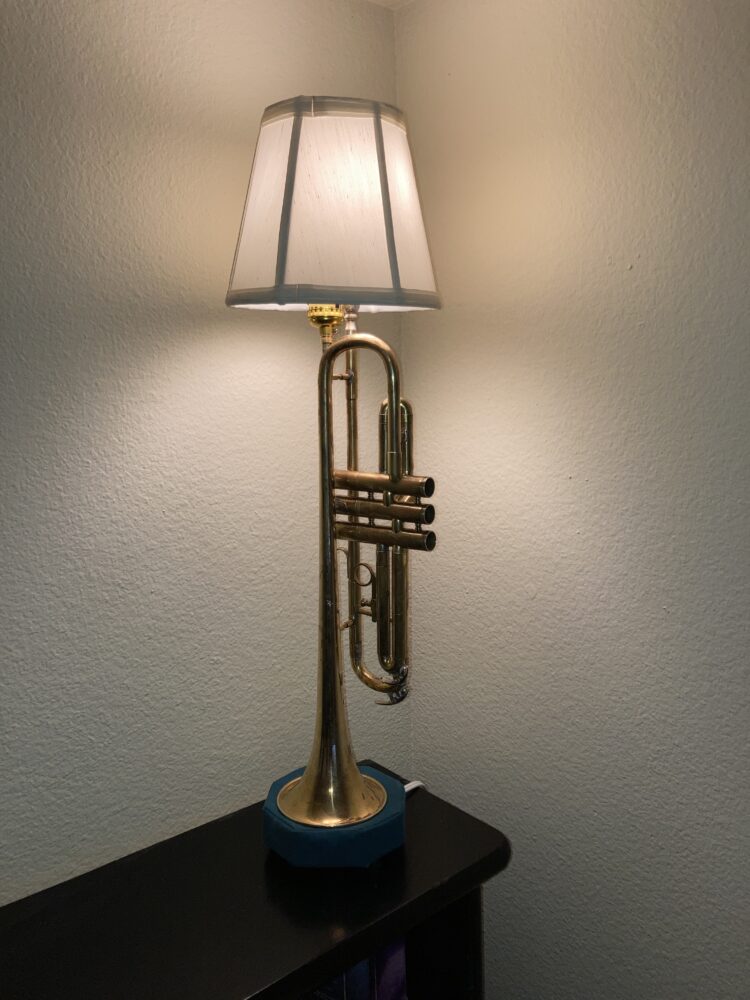
I successfully designed and fabricated a trumpet lamp! I am excited that I like what I made since I was slow to think of a design path that seemed interesting to keep, fun to make and simple enough that it could be fabricated in campus in the amount of time I have to give this class. I have been using this lamp instead of the lamp that was previously on my bedside shelf.
Aesthetic Inspiration
I have chosen to make my Upcycle Project in an Irish Pub aesthetic. Some of the main features of an Irish Pub aesthetic are dark wood, old relics, live music, and often dark colors such as green, red and blue. Initially my design project aesthetic was inspired by memories of my semester in Ireland and the cello that was graciously donated to me by H. B. Woodsongs. When I was initially thinking about what aesthetic I could use cello pieces for the dark wood reminded me of the Irish pubs I visited last spring. I studied abroad for the spring semester in Dublin and visited pubs across Ireland. From pubs in small villages to pubs in the city centers there were many similar features. One of my favorite features were the deep tones of wood and decor since they made the pubs feel older and cozier than most dining and drinking establishments in the United States. Additionally, traditional Irish pubs are filled with conversation and live music. Common instruments are fiddles, guitars, uillean pipes and bodhráns (a type of drum). While I did not end up with any of these instruments to work with, it seemed fitting to try to upcycle an instrument in an Irish pub aesthetic since music plays such a large role in the Irish culture and pub life.
Material Collection and Project inspiration
When I first learned about this upcycle project I was excited but was also lacking ideas that I would actually want to follow through with. Eventually I was chatting with my roommates about this project and one of them suggested that some music stores might have old instruments I could upcycle. She knew I enjoy music and I instantly loved the idea. Her recommended music store to start with was Rocky Mountain Music Repair since the owners very generously donate a bunch of instruments to local music programs each year. When I first called Rocky Mountain Music Repair the owners were on vacation and I was told to wait a week so I decided to see if H. B. Woodsongs would have anything. At the time I was thinking that a coat rack made from a stringed-instrument neck would be cool, so calling a music store that specializes in stringed-instruments seemed like a good start. H. B. Woodsongs had a cello that was cracked and chipped beyond repair that they were willing to give me, which was lovely but upon picking up the cello and starting to build a design around it I realized it wasn’t going to be as nice to work with as I had envisioned. To start the neck was actually relatively short so I would need to find a way to add on to the neck so the coat rack didn’t look to short and the neck didn’t look to hodge-podge. I also didn’t love how far the scroll of the neck stuck out from the fingerboard. Rocky Mountain Music Repair eventually got bac to me and I was able to take some mouthpieces, a trumpet and trombone. I thought the mount pieces could make good hooks for a coat rack, but as previously stated I wasn’t loving my initial coat rack idea. After playing the trumpet and trombone and trying to think of ideas I eventually had the revelation that they could make spectacular lamps. Upon searching “trumpet lamp” and “trombone lamp” it was clear that I am not the first person to have the same thought but I proceeded to design my own. I wanted to feel like I had designed my lamp so I did not try to find a trumpet or trombone lamp tutorial.
Set on a design idea I was excited to make I set about collecting the rest of the materials I would need. First I went to Home Depot and bought extension cords and lamp sockets. After leaving the store I realized I needed something to hold the lamp socket upright so I bought those parts from McGuckin’s.
The trombone is long and doesn’t balance as easily so I decide to finish the trumpet lamp first for this project and eventually make a complimentary trombone lamp. The simplest material to manufacture quickly at the Idea Forge is wood and the Makerspace area had a good selection of scrap wood for my use since I didn’t need a piece of would that was big or particularly nice. When choosing wood I decided I didn’t like how the colors of the bare wood clashed with the trumpet and also thought that covering a block of wood in fabric would be a nice way to add another color to my lamp. To find fabric I went to Art Parts Reuse Center in North Boulder and browsed collections of scrap fabric until I found a fabric that looked nice, felt durable and seemed good for sewing. I came away with a deep teal canvas for a very reasonable price. The final part of the base was finding a piece of PVC that fit much of the way up the trumpet.
Lamp Design and Fabrication
After figuring out that I wanted to orient the trumpet based down I figured out that the trumpet balances easily on its own but isn’t that stable in the balanced position so my base should add some support but didn’t need to be super large or heavy. Additionally, since I was sewing fabric over the base I decided that an octagonal would be nicer to sew and still look nice. This lead me to cut an octagonal wooden block from a scrap 2″ x 6″ wood board. After cutting the outer shape as shown, I also drilled a hole for the PVC pipe to rest in using a hole saw. The sizes of the hole saws were not optimal for achieving a snug fit so I ended up selecting a slightly too big saw size and wrapped tape around the PVC pipe to yield a snug fit.
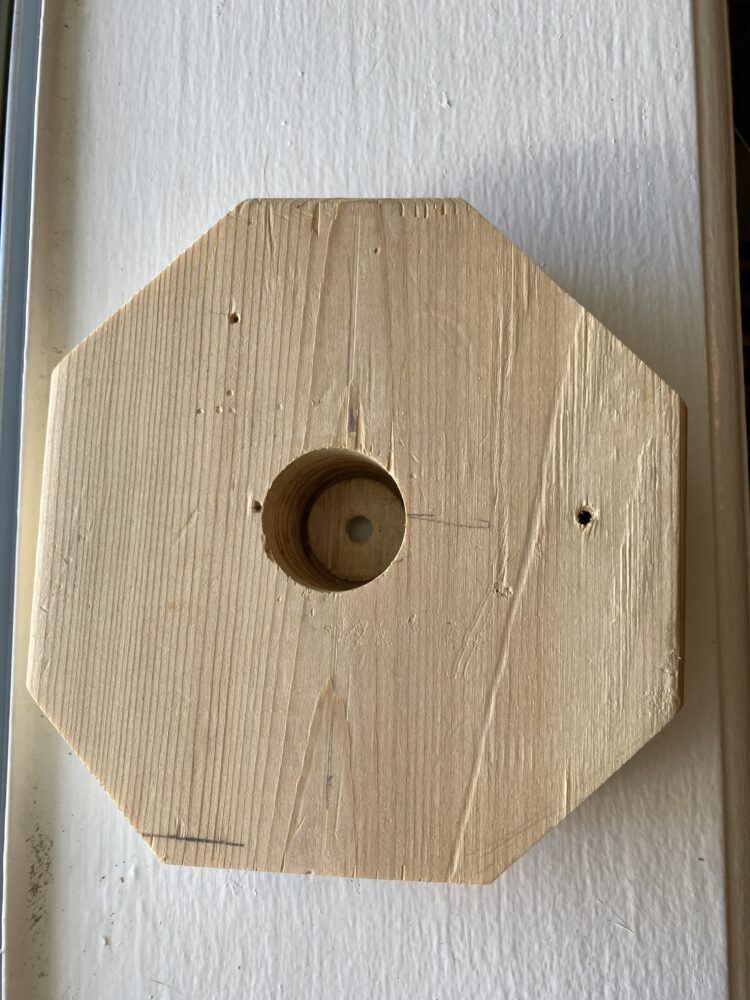
To make a pattern for the fabric I traced the block onto a piece of paper and then added a half inch to saw along the length of each side. I cut out this octagon with sewing tabs and then traced a top and bottom unto my fabric which were then cut out. For the sides of the block I rolled the block one full rotation to estimate the length and increase the width for space to sew. I was able to completely sew the side fabric onto the top octagon using a sewing machine and half the bottom octagon. At this point I slide the block into the fabric pocket and hand sewed the remaining edges using. I used a slip stitch which is a type of stitch that allows a seam to be closed without visible stitches.
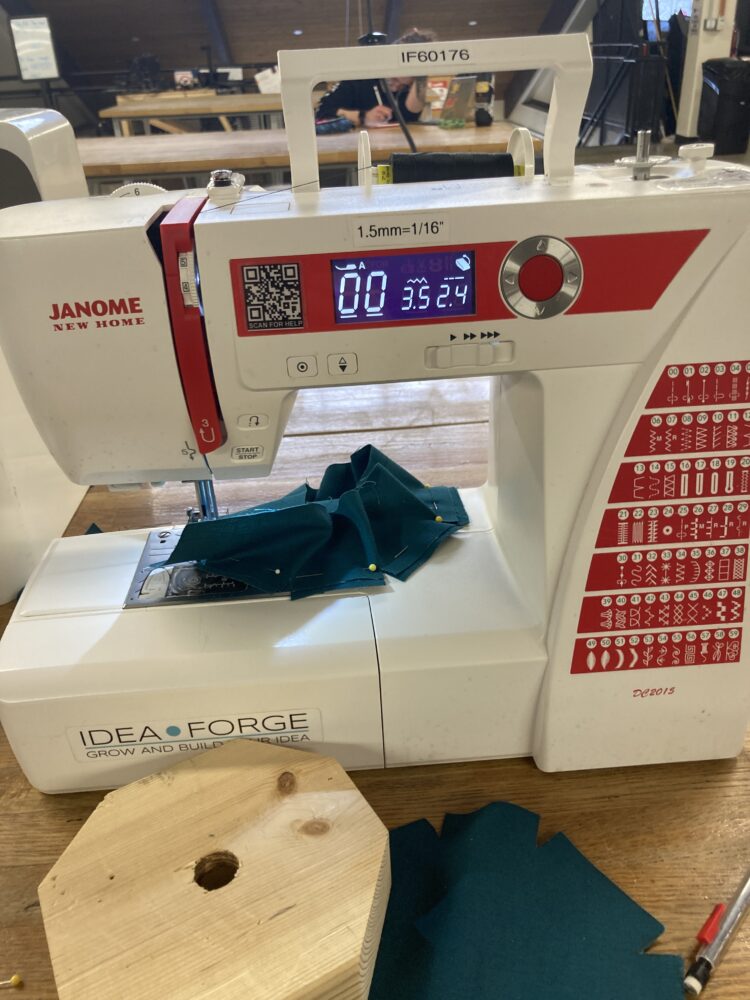
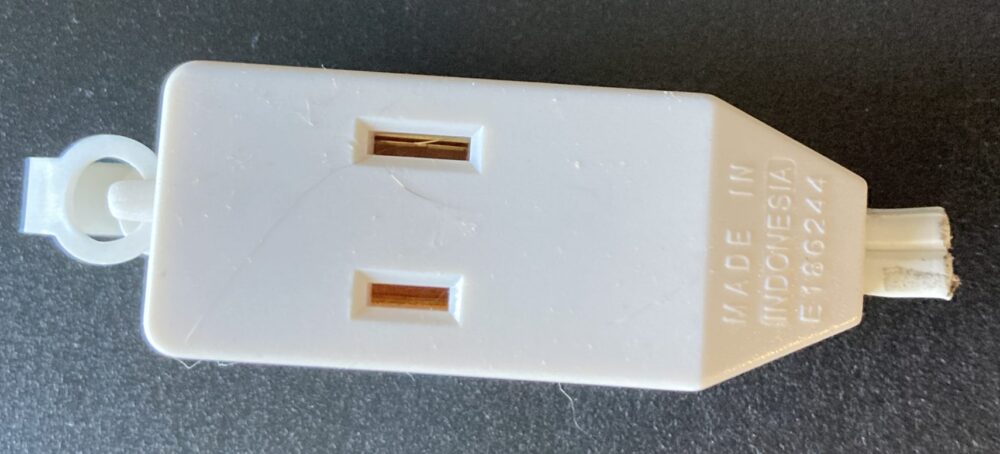
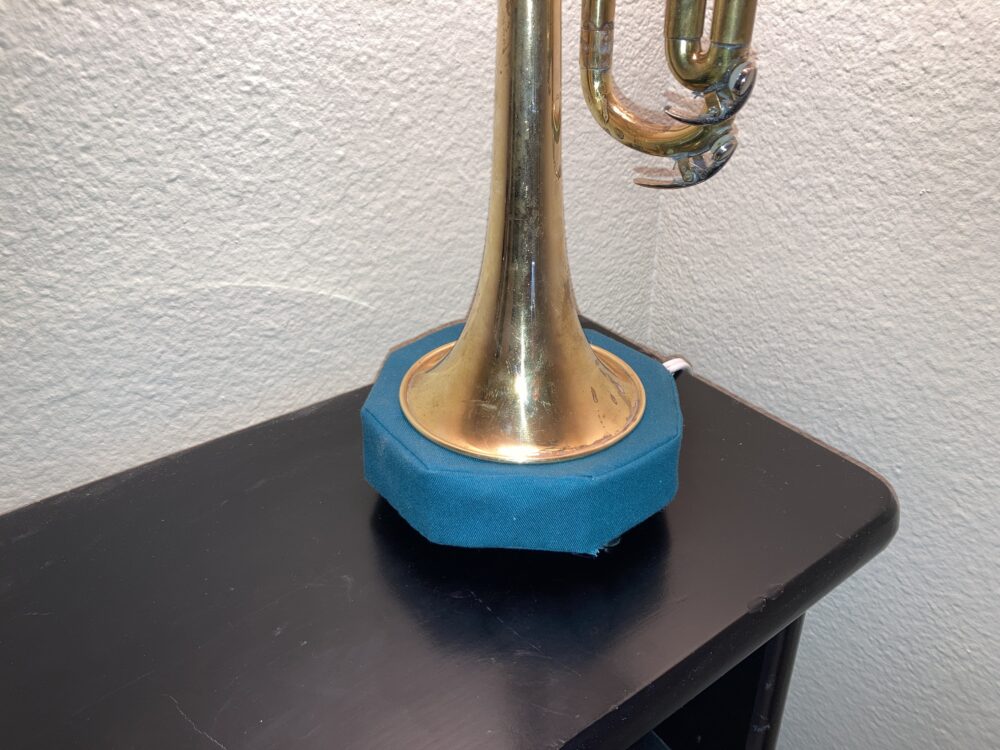
The last part of fabrication was wiring the lamp. I started by cutting the extension cord so I had the prong side and a long cable. Next I decided I would try to run the wire through the base, the PVC and into the trumpet going up the bell, down as straight as possible through the valve tubing and up the last straight section coming out where the mouth piece sits. I successfully routed a piece of string and then a piece of yarn without issues. Then I started moving the lamp wired through. Things went fairly easily until I it the first valve section where the wire needed to make a slight jog into a new tube. Using metal chopsticks I was able to inch my wire through two valves each time making a slight bend. However at the third valve I could not get the wire to budge any further. After about an hour of prying and wiggling I made a new simplified plan and drilled a hole at the top of the trumpet so the wire only had to go up the bell and out the hole. Once the wire was through the trumpet the lamp socket was easily wired.
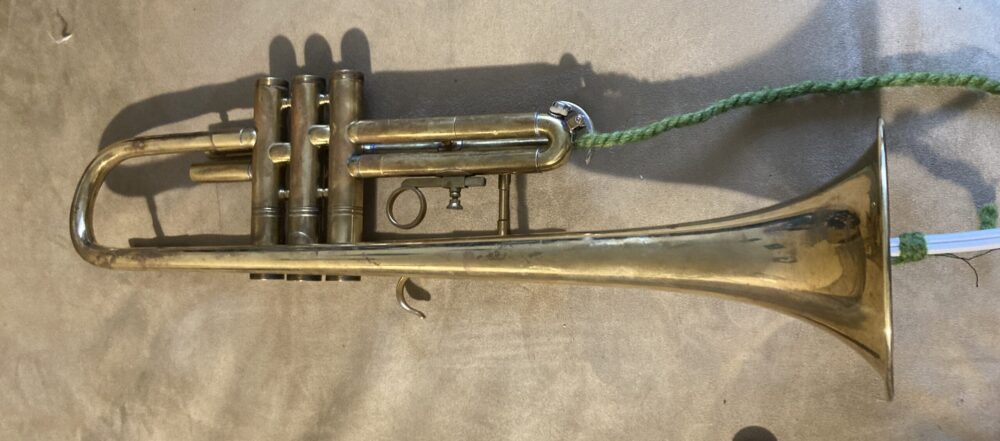
I screwed in a lightbulb and everything works. The final piece is the lamp shade. I am determined to thrift a lamp shade and ideally one that is a deep red and decorated. I have not found one in any of the Boulder thrift stores, but I have a friend who works at Resource Center that is keeping and eye on lamp shades for me. I also had a lamp with a lampshade that works well enough so that is what I am using for now.
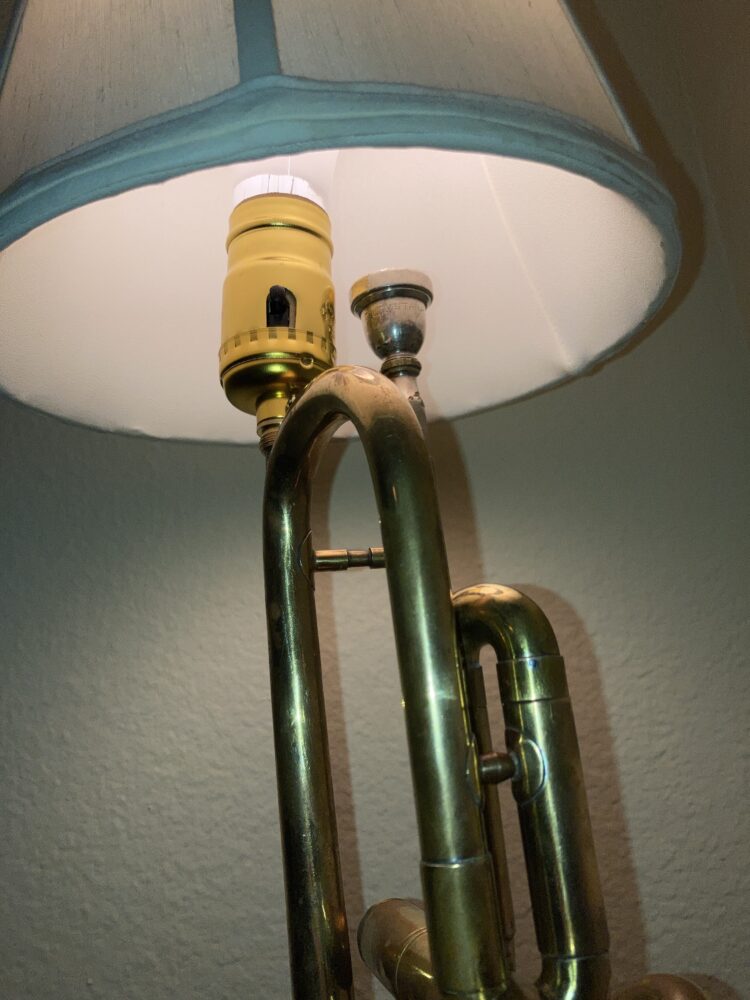
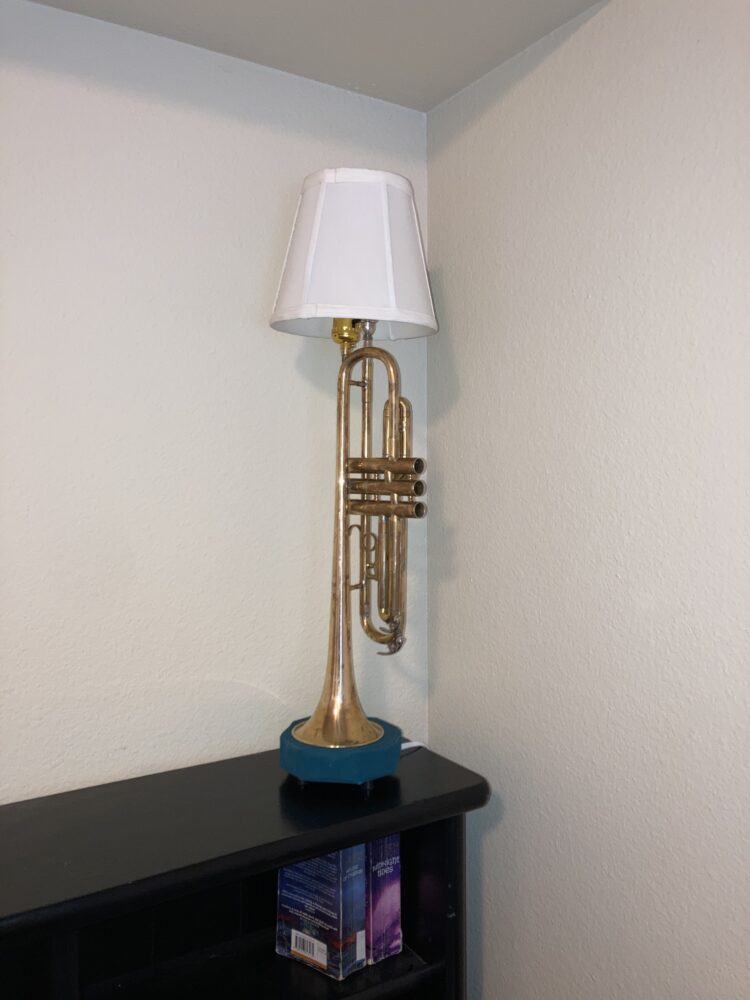
Final Thoughts
My lamp works so my functional goal was met and I plan to use it. My lamp is relatively dim, has tarnished brass and a dark-colored based which all fit the Irish pub aesthetic, however I am hoping to find a lamp shade that is also a darker color to fit the aesthetic more. Other than finding a different lamp shade I do not plan to make more revisions to my design.
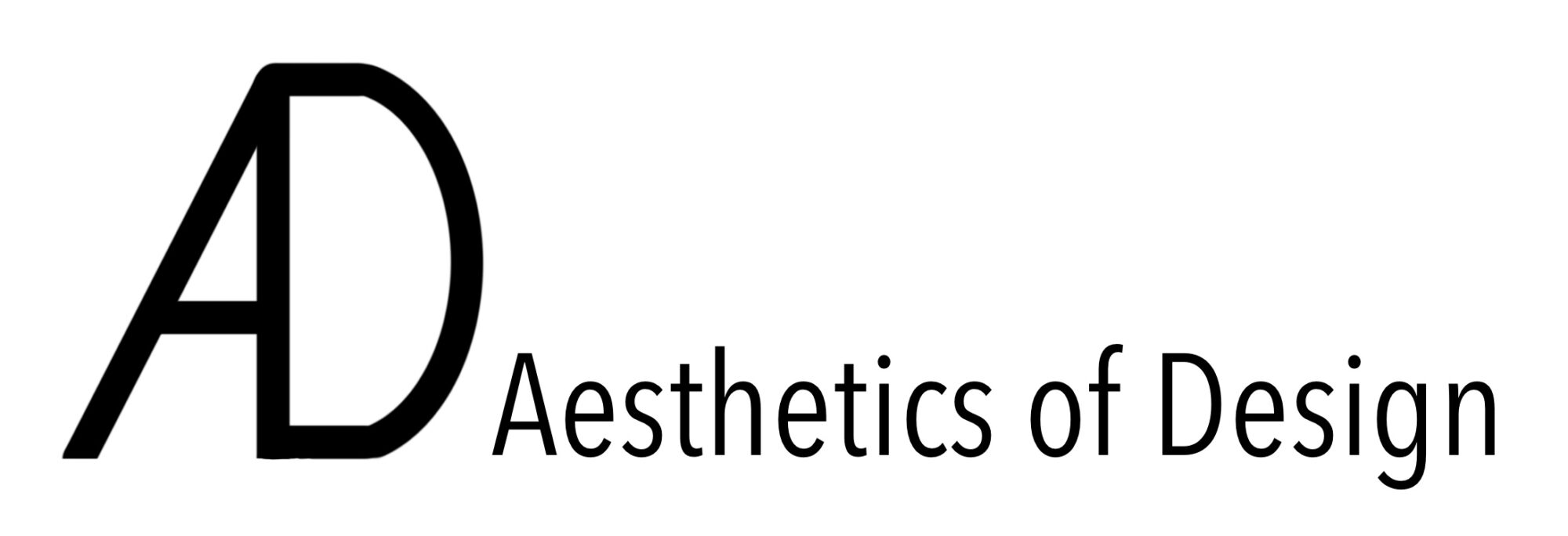
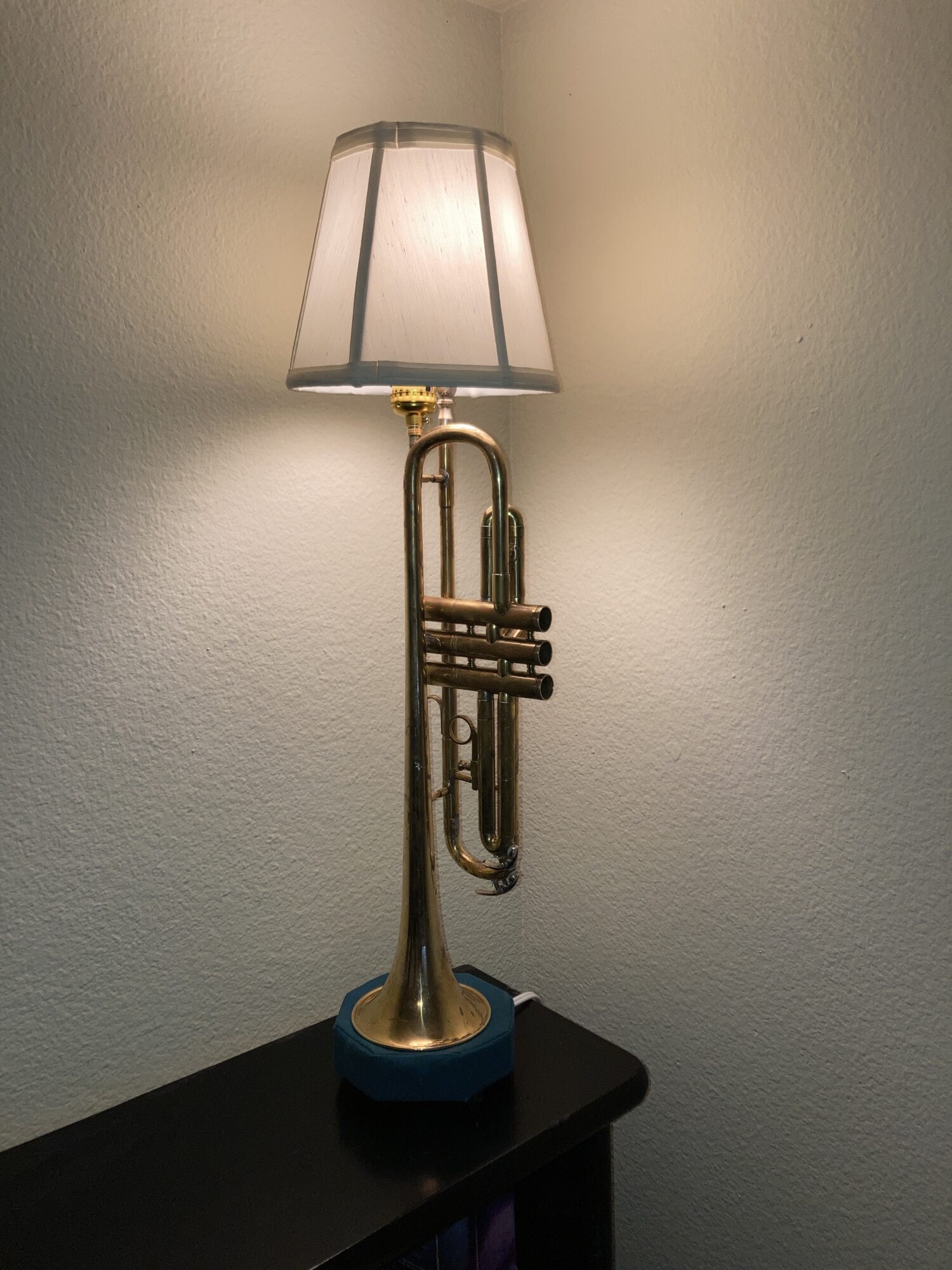
4 Comments. Leave new
Your lamp turned out great, Abigail! I found it interesting how you were inspired by your time abroad and I think you did an excellent job capturing the ambiance of an Irish Pub! The final product looks well put together and carefully thought out with the wiring integration appearing seamless. I was wondering if some of your inspiration came from any instruments that you played in the past or if you just have an interest in music. Great work on the project!
Thanks! I never played the trumpet so I would say that wasn’t a huge factor in my inspiration for the specific instruments, however loving musical instruments in what inspired me to reach out to music stores.
Hey Abigail, your trumpet lamp project is completely unique and I love it! Your artifact showcases a thoughtful blend of creativity and functionality, aligning well with the Irish Pub aesthetic you aimed to capture. The journey from conceptualization to fabrication illustrates a commendable problem-solving approach, particularly in adapting the initial coat rack idea to crafting unique lamps from trumpet and trombone mouthpieces. Your attention to detail, from selecting materials to meticulously sewing the fabric covering for the lamp base, reflects a commitment to quality craftsmanship.
As you continue to refine your lamp, the quest for a suitable lampshade adds an intriguing dimension to your project. How do you envision the ideal lampshade contributing to the overall ambiance of your trumpet lamp within the Irish Pub aesthetic?
My goal for the lampshade is to add one more dark color (red, green ideally), seem old, and to dim the lamp since Irish Pubs are generally old establishments and dimly lit.